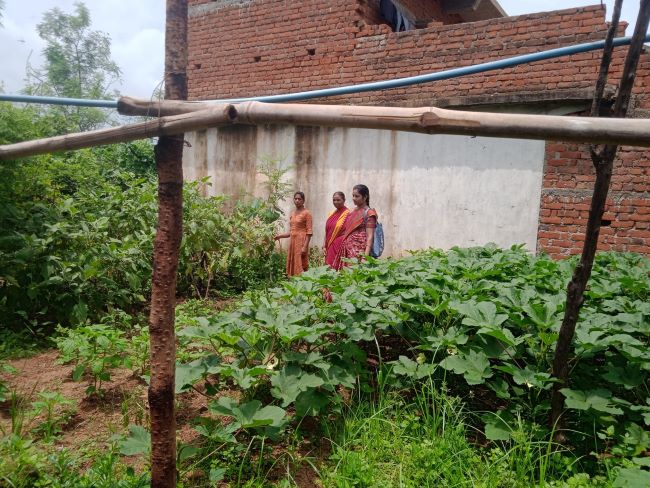Odisha Channel Bureau
Bhubaneswar: Around 1,643 families from 168 villages in five districts of Odisha grow green vegetables in small patches, and eat directly from the garden. No holes burnt in pocket, yet a nutritious platter to savour after a hard day’s work.
The kitchen garden initiative, implemented by CRY and its partners in Balangir, Bargarh, Kandhamal, Koraput and Kalanhandi, has combatted hunger and nutritional security and provided remote communities with a sustainable solution to arrange for a diverse and rich diet, all year long.

Families are encouraged to grow Moringa, Banana, Papaya, Leafy vegetables, Tomato, Beans, Brinjal, Chilly, Cucumber, Lady Finger, Gourd, Spiny Gourd, Ivy Gourd, Maize, Radish, Bitter Gourd and Pumpkin, in their backyards. The state government’s Mo Upakari Bagicha scheme has been a welcome initiative, under which 13-18 varieties of vegetable seeds are supplied to all blocks in the state.
Anita Bariha, from Sadanandapur village in Bargarh, fell ill during her first trimester. In the absence of a regular nutritious diet, her haemoglobin count had dropped below 7. Officials from Palli Alok Pathagar, CRY’s partner organisation working in the village, visited Anita and requested her to take iron supplements regularly. More importantly, they suggested that she grow a kitchen garden in the small patch of land behind her house and also helped her to arrange for seeds. Anita followed the advice, and is reaping the benefits – fresh vegetables from the garden to fill up the platter, with minimum spent. As she waits for her first baby, she is confident that she would be able to provide her family with nutritious food without a struggle.
“Our most important task is to make communities aware of the importance of a nutritional diet, for children, adolescents and adults alike. And the best way to ensure that there are greens on the plate is to grow them in your own garden, at very little cost. It’s a win-win situation, and we have been trying to spread this awareness among the families here for the last few years,” said a volunteer from Palli Alok Pathagar, which works in 19 villages of Bargarh district.
Three years ago, when lockdown set in, Trilochan and Nirmali Bhoi of Bhengrajpur village in Paikmal block, Bargarh, were struggling to arrange for a square meal for their two children. Field workers encouraged them to plant vegetables in the small piece of land beside their hut. “Initially, I was a little sceptic about it”, recalls Trilochan. But the idea caught Nirmali’s fancy, as she wanted to give it a try. “We were already starving, so what worse could happen to us,” she said. In a couple of months, the garden started providing for a nutritious platter for the family. And in another two months, it also turned out to be a viable livelihood option for them. Nirmali planted papaya, moringa, okra, cow pea, pumpkin, coriander, guar and bitter gourd. As the days went by, the kitchen garden not only helped the family eat healthy, but increased their income by enabling them to sell the surplus produce to their neighbours. Over the last three years, Nirmali’s successful venture inspired many of her neighbours to grow kitchen gardens of their own.
Chale Chalo, another CRY partner, works to ensure nutritional well-being of children, adolescents and communities in 28 villages of Kalahandi, a remote district in western Odisha. “We have been doing regular sessions and follow-up visits to encourage families to grow kitchen gardens of their own. Most of the families have started growing kitchen gardens, which have benefitted them immensely. We have sourced seeds packet in collaboration with the horticultural department and distributed them among during village events,” Regular consumption of organic vegetables from the kitchen garden, has ensured that issues such as anemia, malnourishment, and low weight have been addressed at home and in quick time,” said a member of Chale Chalo.
“The success of the kitchen garden initiative in Odisha districts reflects our constant endeavor to work towards sustainable solutions to health and nutritional issues of children, adolescents and communities,” says Trina Chakrabarti, Regional Director, CRY (East).

















